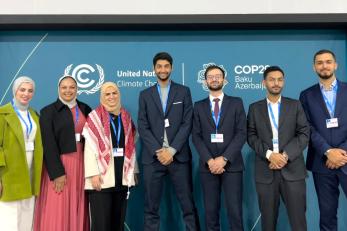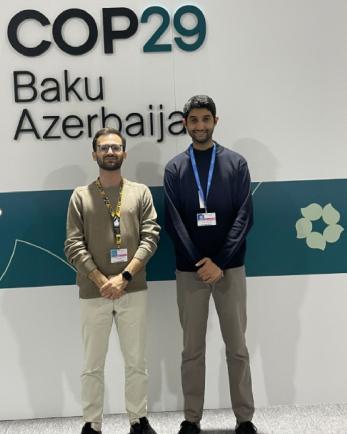From Bonn to Belém, learning from Baku: progress in preparation for COP30

At COP29, seven young Jordanians stepped onto the global climate negotiations stage. Their experience sheds light on what must change ahead of COP30 in Belém: youth cannot remain on the margins of climate diplomacy.
Just months later, as climate negotiators gathered in Bonn, Germany to prepare the groundwork for COP30, it was clear that progress remains limited. Youth voices were present and visible yet not meaningfully included in decision-making spaces. A persistent disconnect endures: young delegates contributed bold ideas and frontline perspectives, but they were rarely embedded in negotiation rooms or positioned to shape final texts. Being handed a microphone at a side event is not the same as having a seat at the table where decisions are made.
While YOUNGO the official UNFCCC youth constituency provides an entry point for youth representation, these roles are limited, inconsistently applied across negotiation tracks, and often remain consultative rather than influential.
This gap is especially striking because young people are among the most invested in securing ambitious outcomes, particularly on climate adaptation. Despite the pledge at COP26 to double adaptation finance by 2025, delivery remains far behind. UNEP’s 2024 Adaptation Gap Report estimates that developing countries need around $300 billion annually to adapt to climate change, yet in 2022 only $28 billion was delivered.
For youth, especially those from climate-vulnerable countries, adaptation is not an abstract policy debate but a matter of survival and intergenerational justice. Their perspectives and leadership are essential if COP30 is to deliver the outcomes that communities are counting on.

In Baku, before Bonn: Mercy Corps’ priority for youth engagement – COP29
In 2024, Jordan offered a promising example of how youth engagement in global climate processes can move beyond symbolic involvement and begin to take shape as structured leadership. Aligned with Mercy Corps’ global priority of strengthening youth voices in climate action, a joint initiative between the Ministry of Environment and Mercy Corps supported seven young Jordanian climate leaders to participate in COP29 in Baku, Azerbaijan.
As a global organization working at the intersection of crisis and resilience, Mercy Corps recognizes that meaningful climate action must include the voices and leadership of young people. Youth empowerment is not just a component of our work, it’s central to our strategy for building climate resilient communities. By combining the Ministry of Environment’s provision of official accreditation and institutional endorsement with Mercy Corps’ mentorship and technical guidance, the initiative created a supportive framework that positioned youth as more than observers, but rather active contributors within one of the world’s most influential policy arenas.
At COP29, Jordan’s youth delegation made its mark as a rising voice in climate leadership. The group not only organized and led side events but also presented policy recommendations developed through their active participation in the MENA Regional Conference of Youth. With creative outreach strategies, they ensured their messages resonated far beyond the conference halls.
From the very start, the delegation showed confidence and determination. They joined high-level discussions without hesitation and quickly distinguished themselves. In one memorable moment, one of the delegates, seated among the audience, lifted their policy paper “The Impact of Wars and Conflicts on the MENA Region” high into the air. What began as a spontaneous gesture sparked immediate interest from participants in the room. The delegation was ready: they had prepared a QR code linking directly to the document. This clever move transformed an improvised act into a strategic opportunity, drawing attendees to scan the code, explore the paper, and even initiate follow-up conversations. A playful moment evolved into a powerful platform for visibility and influence.
Their contributions gained traction through international media coverage and collaborations with peers from across regions. Yet, their journey also highlighted the persistent structural challenges that constrain youth participation in global forums, including financial barriers, logistical hurdles, and the steep learning curve of navigating international negotiations.
Lessons for COP30: What the journey from Baku to Bonn reveals:
- Youth leadership must be cultivated, moving beyond token representation which requires formal roles for youth in negotiation and policy planning processes.
- Access is just the first step, resources, mentorship, and technical preparation are necessary to translate presence into meaningful influence.
- Partnerships make engagement possible, collaboration between governments, civil society, and international institutions helps lower barriers and institutionalize youth participation.
- Youth perspectives add value, their lived experiences and innovative approaches enhance the quality and accountability of climate policymaking.
- As preparations for COP30 in Belém continue, the Jordanian experience illustrates both progress made and areas where more can be done. It shows how, when youth are supported through institutional partnerships and strategic mentorship, engagement can evolve into leadership, offering a pathway for embedding young voices in global climate governance.
"True impact begins when youth unite under a shared vision, one that transcends borders and brings together our voices, ideas, and actions. By working collectively, we can tackle pressing challenges like water scarcity and climate adaptation with coordinated strategies that create lasting change. The strength of our movement lies not just in ambition, but in our ability to act as one." said Ghazi Al-Sharqawi, a youth delegation member.